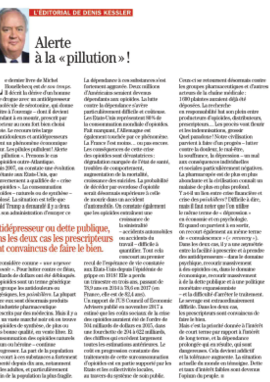- FR
- EN
"Pillution"alert ! - EDITORIAL FOR CHALLENGES BY DENIS KESSLER
Chairman & CEO of SCOR, Denis Kessler publishes an editorial piece in the French weekly Challenges, covering economic, political and financial current events in France and worldwide.

The latest book by Michel Houellebecq is very much of its time. It follows the misadventures of a man taking an anti-depressant – the “serotonin” of the book’s title – to which he becomes fatally addicted, after prescription by the aptly named Dr. Azote (Dr. Nitrogen). The widespread use of painkillers and anti-depressants has become a major economic phenomenon. The pills are proliferating! “Pillution” alert!
Consider the situation with opioids in the USA. Since 2007, we have seen a worrying trend, which the US government has described as an “opioid crisis”. The consumption of opioids, whether natural or synthetic, has exploded. The situation is such that, two years ago, Donald Trump asked his government to tackle what he described as “a national emergency”. A budget of $6 billion was made available to deal with this scourge.
Opioids is a generic term for a group of painkillers. Most of them are now produced by the pharmaceutical industry and prescribed by doctors. But there is also a huge black market, where synthetic opioids of variable quality are freely available. And the consumption of natural opioids – opium and heroin – continues to rise. The share of the population using these substances has risen sharply over the past ten years, notably amongst adults and particularly in the most vulnerable sections of society.
Dependency on these substances has increased significantly. Two million Americans have become dependent on opioids. Tackling this dependency is proving particularly difficult and costly.
The USA accounts for 80% of global opioid consumption. Strikingly, Germany has also been affected by the phenomenon. The impact on France has been less serious... so far.
The consequences of this opioid crisis are devastating: marked deterioration in health, behavioral difficulties, higher mortality, rising suicide rates. The chances of dying from an opioid overdose are now greater than those of dying in a car accident. We are also seeing opioid use feeding through into an increase in insurance claims – for car accidents and accidents at work – that is hard to quantify. The overall effect has contributed to the first fall in life expectancy in the USA since the flu epidemic of 1918! It has declined by three months in three years, falling from 78.9 years in 2014 to 78.6 years by 2017 (in France it is 82.4 years).
A report by the US Council of Economic Advisers, published in November 2017, estimated that the societal cost of the opioid crisis amounted to around $504 billion in 2015, with overall estimates ranging from a low of $294 billion to a high of $622 billion - significantly higher figures than any previous estimates. The relentlessly rising cost of treatment for over-consumption of opioids is partly borne by states and local authorities, through the public healthcare system. These bodies are now turning against pharmaceutical groups and other actors in the medical chain: 1,600 lawsuits have already been filed. The quest to hold opioid producers, distributors and prescribers accountable is in full flow. Court cases will multiply, and payouts will increase.
What a paradox! Our civilization is managing to turn progress – a means of treating pain, suffering and depression – into a problem with particularly negative individual and social consequences. As the pharmacopoeia becomes more abundant, our civilization suffers an ever-deeper malaise.
Is there a link between the financial crisis and the painkiller crisis? It is hard to say for certain, although it is worth noting that the term “depression” is used in both economics and psychology. Similarly, the term “recovery” is used in both fields. In both cases there is an asymmetry between the ease with which anti-depressive solutions can be prescribed and used – mass recourse to opioids in medicine and to public debt and expansionary monetary policy in economics – and the difficulties inherent in stopping the treatment. Withdrawal is extraordinarily difficult. In both cases, the prescribers believe that they are doing good.
But the priority given to short-term interests over long-term ones, and the consequent prolonged dependency, are dangerous. Addiction ensues and tolerance of the ‘drug’ increases. The current situation in the world bears witness to this. Debt and low interest rates have become the opium of the people!
